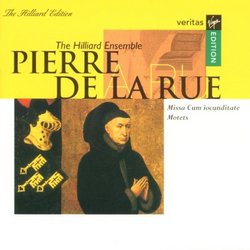Serene and peaceful but never dull!
Leslie Richford | Selsingen, Lower Saxony | 12/13/2004
(5 out of 5 stars)
"Pierre de la Rue flourished between about 1485 and 1510. He spent several years at the Imperial Court in Spain, but he was more permanently associated with towns which today belong to the Netherlands and Belgium: ?s Hertogenbosch, Mechelen and Kortrijk. He belonged to the highly esteemed Flemish school of polyphony, and his influence can be found a century later in the work of Palestrina. The Hilliard Ensemble has chosen to record seven of his four-part motets and his popular mass ?Cum iocunditate?, which only departs from the four-part scheme in the Credo, where an additional countertenor is called for. The music flows serenely from one number to the next, and it is in fact praise indeed to say that this is a typical Hilliard disc, the interweaving of perfectly intonating male voices creating a tapestry of sound that is peaceful but not soporific (so much for comments like "dull"!). The blend of the voices (David James, Rogers Covey-Crump, John Potter and Paul Hillier) is ideal, and only rarely did I gain the impression that David James?s rather reedy countertenor was dominating the ensemble. The recording was made in September 1990 at Douai Abbey Church in England and was one of the last featuring founder-member Paul Hillier. If you are into Renaissance polyphony sung with all-male voices, then you will not want to miss this treasure of an album."


 Track Listings (12) - Disc #1
Track Listings (12) - Disc #1